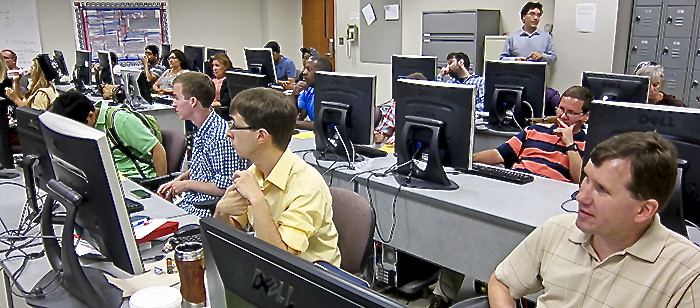
The third Innovations in Cybersecurity Education Workshop (ICEW) will be held from 9:00am to 5:00pm on Friday, June 3, 2016 on the UMBC campus.
ICEW is a free regional workshop on cybersecurity education from high school through post-graduate. It is intended primarily for educators who are teaching cybersecurity at high schools, colleges, and community colleges. Anyone is welcome to attend, including teachers, students, administrators, researchers, and government officials. It will highlight master teachers and ongoing educational projects, including an effort at the US Naval Academy to teach cybersecurity to all midshipmen. The workshop will feature hands-on learning activities, including secure programming, cyber competition, and an educational game.
Sessions will include:
- Secure coding through hands-on exercise: Blair Taylor and Siddharth Kaza (Towson University) will show how to carry out self-contained, lab-based modules designed to be injected into CS0-CS2 introductory computer science courses.
- Using a message board as a hands-on learning tool for Cyber Security II: LCDR Chris W. Hoffmeister (US Naval Academy) will discuss how to solve security challenges involving a simple, configurable HTML message board.
- Hands-on vulnerability testing: Marcelle Lee (Anne Arundel Community College) and Steve Morrill (Loyola Blakefield) will demonstrate how to engage in a hands-on challenge and learning experience to help highlight the vulnerabilities in systems, with you in the driver’s seat. Participants of any skill level will learn strategies and techniques for determining if a system is vulnerable.
- Hands-on group threat brainstorming with Security Cards: Tamara Denning (University of Utah) will demonstrate teaching students how to think broadly and creatively about computer security threats using 42 Security Cards along four dimensions (suits): human impact, adversary’s motivation, adversary’s resources, and adversary’s methods.
ICEW is free and open to the public — all are welcome to attend. This workshop will to be of interest to educators, school administrators, undergraduate and graduate students, and government officials. Lunch will be provided. There is ample parking.
For more information and to register, see the 2016 ICEW Web site.
